
What Does a Dietitian Do?
What does a Registered Dietitian do? This is a common question among many perusing their benefit coverage and seeing Registered Dietitian (RD) listed under consulting health professionals. We all seem to know about registered physiotherapists, psychotherapists and pharmacists are, but what does a Registered Dietitian do? In fact, answering this common question is something that Universities do not prepare nutrition students for. Instead, we hold a naïve (and erroneous) idea that everyone ‘knows’ what a Dietitian is and how he/she helps others. WRONG.

This year, March 16th celebrates Dietitians Day!
Therefore, today I will explain what a Registered Dietitian is, answer related questions and highlight five ways he/she can help. Since March is Nutrition Month, let’s promote dietitians as the most trusted source of nutrition information. Also, March 16th(the third Wednesday of March) will be Dietitians Day. Hopefully this blog inspires you to receive science-based nutrition information from a credible, up-to-date, dietitian (like our team). Therefore, be sure to reach out to work with one, refer a family member or thank your friendly dietitian for the support.
What’s a Registered Dietitian?
A Registered Dietitian (RD) is a regulated health professional with comprehensive and rigorous training in the field of nutrition. One must have the following education to hold the RD title:
- Minimum 4 year Bachelor’s degree in food and nutrition.
- Completion of minimum 1 year accredited dietetic internship in clinical or community setting with over 1,250 hours of supervised training.
- Must pass Dietetic Registration licensing exam.
- Optional: Masters or PhD degrees, continuing education certificates (Certified Diabetes Educator, Motivational Interviewing, Culinary Arts, Sports Nutrition, etc.)

Are Registered Dietitians Regulated?
Registered Dietitians are a regulated health profession. This means they must practice in accordance to laws and standards set to protect the public. Additionally, dietitians must complete yearly quality assurance reviews to ensure up-to-date education, ethical practice and competence in their practices.
Dietitian vs. Nutritionist?
A Dietitian is not he same as a Nutritionist in terms of education, qualifications or professional regulation. The title Dietitian is protected, which means ONLY Registered Dietitians can call themselves “dietitians.” Whereas, Nutritionist is an unregulated term (with exception of Alberta, Quebec and Nova Scotia), which means that anyone can call themselves a Nutritionist without specific training or registered licencing. The regulation of the term Nutritionist in the above three provinces ensures that only Registered Dietitians can use the term Nutritionist. Nevertheless, advocacy in Ontario may one day offer the same protection that the title Nutritionist falls under the Dietetic profession.
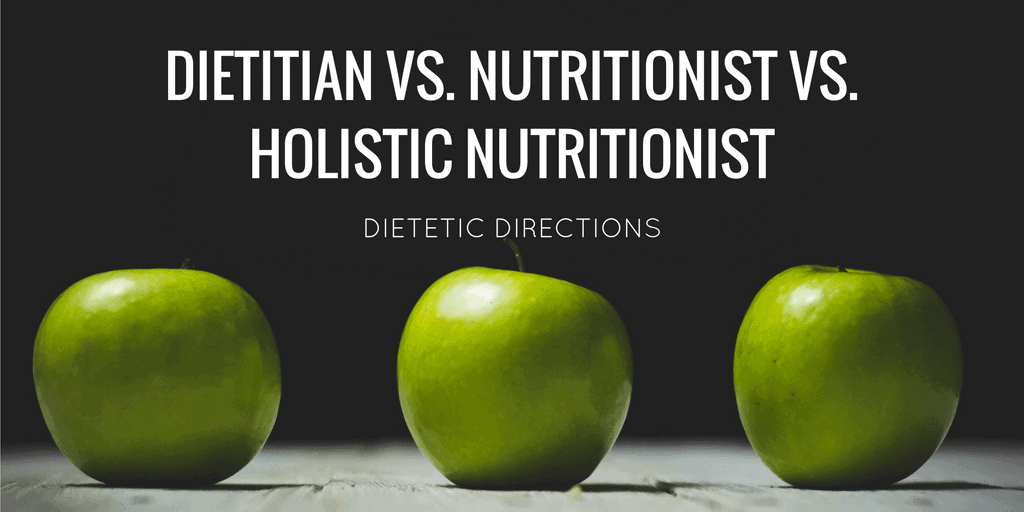
What Are Different Roles of a Dietitian?
There are many different sectors dietitians can work in. Traditionally, they have worked in hospitals, food service or community settings. Now, we have dietitians breaking the mold into a world of ever-expanding, non-traditional roles such as TV spokesperson, writing for public consumption, leading cooking classes and running private practices or businesses, like Dietetic Directions.

Here are more Roles for a Dietitian:
- Scientific Researchers
- Policy Makers
- Innovators in the Food and Nutrition Industry
- Farm-to-table communicators
- Working in Plant Bio-technology
- Hospital in-patient and out-patient settings
- Virtual counselling as private practice
- Long Term Care homes
- Sports Nutrition Centres with Professional Sports Teams or Olympians
- Teaching at Universities or Colleges
- Writers in Newspapers, magazines, journals or blogs
- Grocery stores
- Public Health
- Eating Disorder Recovery
- And more!
What Does a Dietitian Do?
The role of a dietitian is as diverse as the professionals themselves. However, in a counselling capacity, a dietitian will often assess a client’s medical history, dietary intake, lab results and lifestyle habits in order to create a nutrition plan for sustainable lifestyle changes. A client may require a specialty diet for improving digestion, managing food allergies or celiac disease. Or perhaps he/she is undergoing cancer treatment, striving to better control blood sugars, or wanting to lower their cholesterol or blood pressure through diet.
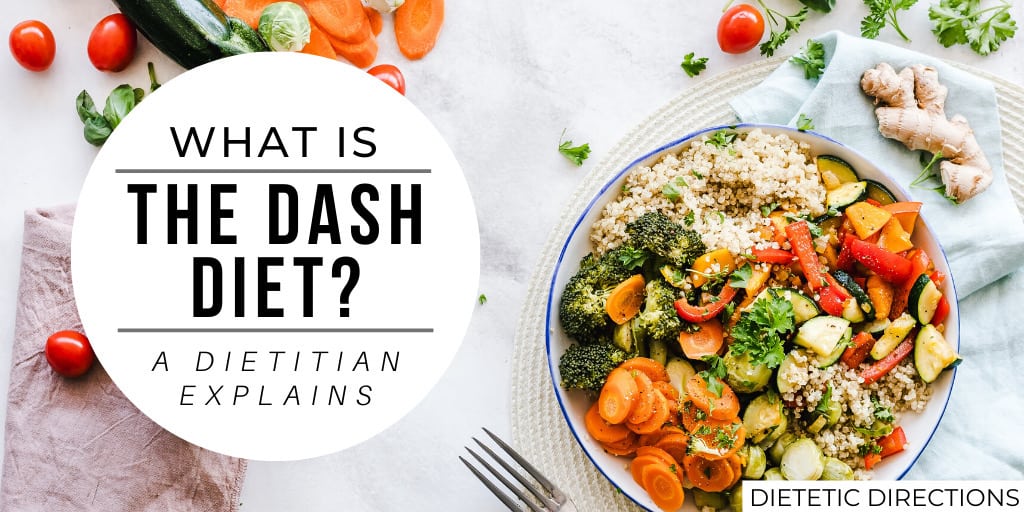
Other clients could be working towards weight management goals or wanting to start meal planning. Perhaps they’re switching to a vegetarian or vegan diet. Additionally, parents seek dietitian support for infant feeding or helping a picky eater become more adventurous. Nevertheless, whatever population group is targeted, a dietitian is assessing dietary intake and making science-based recommendations. Be sure to check out specialty areas of our Registered Dietitians on the Dietetic Directions team.
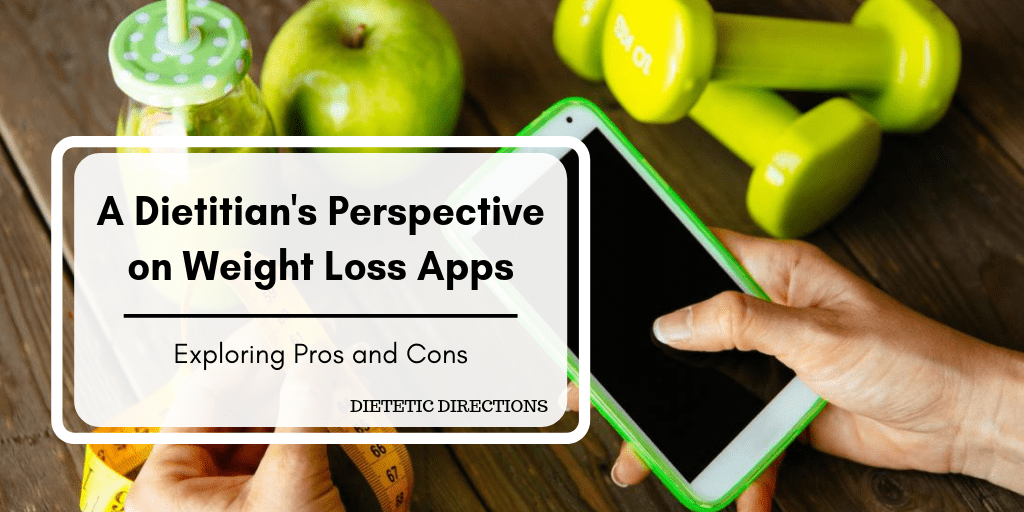
What’s My Dietitian Role?
My role as a dietitian is business owner, food blogger, TV spokesperson and counselling dietitian. So my day-to-day activities could include researching, writing, recipe developing with food photography, marketing and consulting/coaching clients. What I find most rewarding is sharing my passion for food and connecting this to improving health, energy and well-being. Overall, I love meal prep, meal planning and breaking down the science into tangible habits that are fun (and delicious!)

What is a Dietitian Salary?
In Canada, the average Dietitian salary is $62,000 a year. As with most professions, there are scales of pay from entry level positions and greater earnings with higher experience.
How Many Dietitians Work in Canada?
There are 9,000 working dietitians in Canada and 87,500 dietitians in the United States.
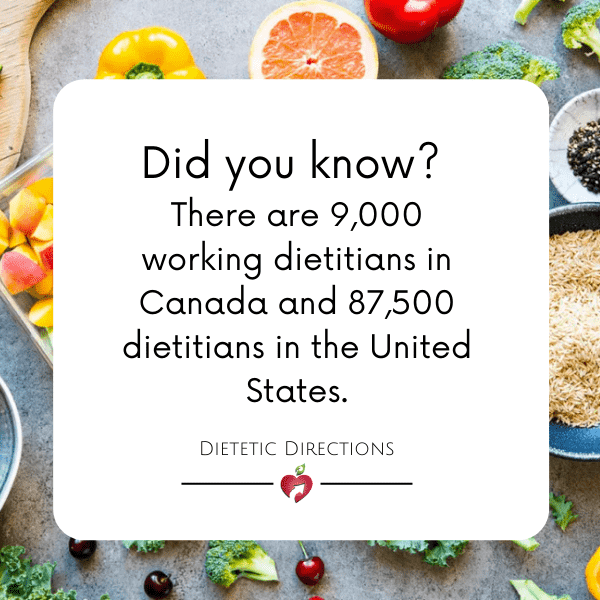
What Does a Dietitian Do in Private Practice?
1. Understand How Nutrition Impacts your Health:
With a variety of different diets and health conditions, deciphering how to optimize your nutrition can be overwhelming. For example, if an individual has a new diagnosis such as diabetes, gestational diabetes, high cholesterol, elevated blood pressure, gout, kidney disease, colitis or IBS, it should be imperative to meet with a credible professional for personalized recommendations. Dietitians are trained in breaking down the science. They cut through the clutter to make recommendations about foods, vitamin supplements or debunking what was heard on Dr. Oz.

2. Create Actionable Strategies:
Meeting with a Registered Dietitian is all about understanding what you can do TODAY to improve your eating habits for a healthier tomorrow. At Dietetic Directions, we break down the science into individualized, research-based strategies for clients to systematically implement. This could mean doing a breakfast transformation for cholesterol lowering or weight management. It could also mean teaching a busy web developer how choose better snacks to prevent the afternoon energy crash or vending machine cravings. We may also do coaching on Meal Planning and/or Meal Prepping so nutritious meals come together with less stress.

3. Examine Psychological Aspects of Eating
Coming up with a nutrition care plan involves working closely with clients to devise realistic strategies based on psychological factors. Food and mental health can be very related, often unknowingly. Additionally, some dietitians are trained in Eating Disorders as well as emotional eating to support their clients. Not uncommonly, one-on-one sessions may stir up feelings and feel a little like a therapy session.
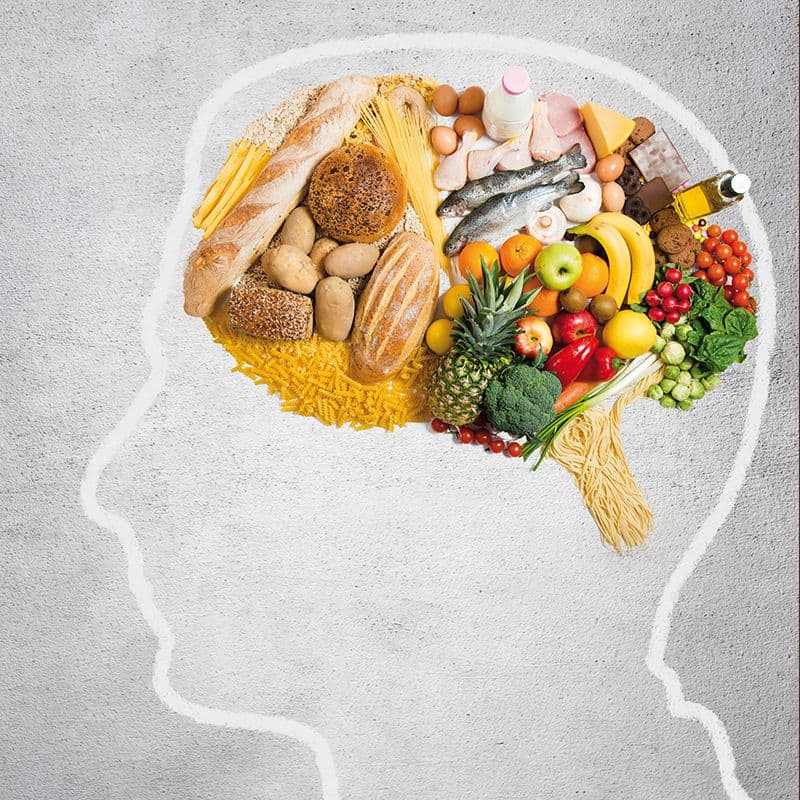
However, the role of a trained mental health professional is often part of the health-care team and not replaced by working with a dietitian. Nevertheless, discussing such feelings as motivators, fears and beliefs can all impact our actions around foods. Dietitians can help bring awareness to our unconscious behaviour; they can support clients who are ready for change.
4. Providing Follow-up for Accountability & Motivation:
A lot of the benefit of working with a dietitian has to do with being held accountable to someone who cares. Consequently, after an Initial Consultation, you will get started with goals. Then we check back in about two to three weeks’ time. As a result, clients begin implementing goals and sharing feedback on challenges and new opportunities. This following up allows the dietitian to build on original goals, get to know the client and provide next steps in the health journey. Specifically, our follow-up journey with clients in digestion relief is discussed in this blog, How to Beat the Bloat with FODMAPs.

5. Understanding Actual FOOD to Make or Eat!
Now, not every dietitian is a foodie, a cook or an expert meal planner. However, our dietitians at Dietetic Directions most certainly are. This means that we love helping you understand WHAT to eat and how much. This makes nutrition fun and tangible. Also, our approach to meals is realistic, based on your schedule, food preferences, budget, family dynamics, etc. Above all, dietitians not only want to empower you to embrace food as fuel for your body, but also equip you with strategies to make healthy eating the easier choice.

Why I Became a Dietitian:
Let’s get a little personal. After all, many people have asked why I became a Registered Dietitian. Overall, I wanted to combine my passion for helping others with a strong interest in food and biological sciences. From an early age, I loved communicating to inspire change. I realized that learning about health/nutrition could lead to wards actionable strategies with real health impacts. Plus, growing up in an Italian-Canadian household, we deeply enjoyed food and talked about it often. Today, my mind naturally loves thinking about meals, as well as simplifying and creating new recipes for a variety of dietary needs. Ultimately, I love my dietitian career and the continued learning that this profession provides.

Bottom Line:
A Registered Dietitian is a regulated health profession that has quality-assurance built into the title. There are many different types of dietitians with different areas of specialty. Overall, dietitians are people who help others and are well-versed in translating science into concrete recommendations. Interestingly, many extended health plans cover working with a dietitian. But you can advocate for this in your workplace if you don’t have coverage! If you are interested in working with a dietitian, be sure to reach out to speak to our dietitian team today! After all, we would love to support you in reaching your health goals!
Now’s your turn! Have you heard of a Dietitian before or understood what the job entails? Overall, we hope you learned a few new items in our blog post!



